![]()
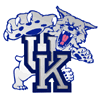 | - Part Two - | 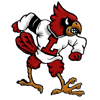 |
![]()
[Link to All-Time Series Results]
Note: This is a continuation of the series history. For the early years of this series, check part one.
![]()
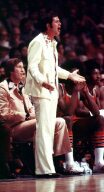 |
The words enraged UK fans who began to call the new coach 'Denny the Crumb' among other less than complementary terms. Already smarting from the phenomenal success of UCLA and John Wooden in the 1960's which cast UK's historic dominance of college basketball in grave doubt, the last thing Kentucky fans wanted to see was a brash disciple of Wooden take up residence in nearby Louisville. When asked about the furor he created, Crum said "I knew about Kentucky and their great basketball tradition, but when I thought of college basketball I thought of UCLA, not Kentucky. In my opinion, coach Wooden was and always will be the greatest coach in the history of the game. I had a hard time understanding why everybody was so upset about the things I said. How could anybody ignore the success of Coach Wooden and the UCLA program?"
Crum's first squad made a remarkable run to the Final Four before bowing out to eventual champion UCLA and Crum's mentor Wooden. It was the beginning of a great career in Louisville for Crum, who would go on to build a nationally feared program of his own. And with each victory and success, the old wounds and tension between UK and U of L continued to fester. Even with Rupp out of the picture, Joe B. Hall continued to adhere to the policy of not playing in-state competition, a policy which continued to rankle the Cardinal faithful.
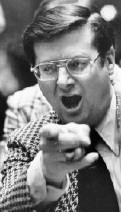 |
Kentucky held up its end of the bargain by beating a tough Syracuse squad. Louisville had a more difficult draw, as they once again faced UCLA (ranked #1 after Indiana's loss) and Wooden. Although they played valiantly, the Cardinals were edged by an inspired Bruin team in an overtime heart-breaker, 75-74. The Bruins would go on to edge UK in the championship final, in what would be Wooden's final game as head coach. Although the ultimate 'Dream Game' never materialized that season, the nation was served notice that the Cardinals would be a force to be reckoned with for years to come. And it served notice to UK that they couldn't ignore the Cardinals forever.
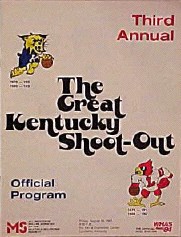 |
At one point, Crum became so exasperated at trying to force a meeting that he decided to take a different tack completely. Said Crum, "We don't need Kentucky. We play one of the toughest schedules in the country - if not THE toughest. We play to sold-out crowds every game. Obviously our program has survived without Kentucky so we don't need them. They must feel the same way since they don't seem to want the game either." But for the most part, it was apparent to all that Crum and the Cardinals were bent on forcing a showdown.
The time was ripe for a match-up, and many fans were behind the efforts. There was so much interest that even a matchup of former players sparked interest. In 1979, a charity game called "The Great Kentucky Shoot-out" was begun between former players of UK and U of L. Players participating for UK included Kevin Grevey, Jack Givens, Mike Pratt, Rick Robey, Reggie Warford, Dan Issel, Kyle Macy and James Lee among others. Former Cardinals included Henry Bacon, Jerry King, Butch Beard, Junior Bridgeman, Wesley Cox, Darrell Griffith, Wes Unseld and Jim Price among others.
As they did in the 1950's, the NCAA took notice of the intense 'non-rivalry' and actively tried to match the two squads. The most obvious match-up occurred in 1982 when the 6th-seed Wildcats were placed in the same sub-region as 3rd-seed Louisville in Nashville, TN. At least it should have occurred, however Kentucky was shocked (50-44) by a lightly regarded Middle Tennessee State squad and never got to face the Cardinals who ended up disposing of the Blue Raiders en route to making the Final Four that year. When asked to compare the two teams, MTSU star Jerry Beck said, 'Louisville would have beaten them [UK] by at least 15 points. . . Louisville's got the most talent and the most quickness I've ever seen. Kentucky's a lot slower."
The following year, the two teams found themselves in the same regional again, with the Cardinals #1 seeded in the Mideast Region with Kentucky seeded #3. The setting was Knoxville Tennessee in UT's dreaded Stokely Center. A meeting was not assured as both teams had formidable foes to overcome. But unlike other meetings which were aborted, both teams held up their end of the bargain to force a showdown. 12th-ranked Kentucky upset 5th-ranked Indiana 64-59. 2nd-ranked Louisville had to overcome a 16-point first-half deficit to 9th-ranked Arkansas before winning the game on a last-second tip by Scooter McCray.
Finally, it came time for the showdown which many fans throughout the Commonwealth and indeed the nation were hoping to see. Dubbed the "Dream Game," the match took the imagination of the entire Commonwealth. During the pre-game, Hall was asked about UK's refusal to schedule Louisville and the coach offered that UK had that year offered to meet the Cardinals in the annual Hall of Fame game in Springfield, MA, yet Crum and the Cardinals refused. Said Crum about the offer, "Playing in Springfield is not what I had in mind. How many of their fans or our fans could go up there for that game ? Besides, they had Sam Bowie coming back with Melvin Turpin and Dirk Minniefield and Jim Master and Dicky Beal and Charles Hurt and Derrick Hord. They were loaded. We lost three starters... My name's Tucker, not sucker."
As it was, the Cardinals weren't as bad off as Crum professed and Kentucky wasn't as good. Bowie would be out of action another year before he could return to the team after a leg injury. The Wildcats would endure one of their classic 'January slumps' causing them to tumble out of the top 10 before bowing out of the SEC Tournament in the first round. Despite being less highly regarded at the beginning of the year, the Cardinals proved to be an athletic, dangerous and balanced team with Milt Wagner, Lancaster Gordon, Charles Jones and Rodney McCray each averaging double figures in points. Scooter McCray and Billy Thompson also played key roles for the Cardinals that year.
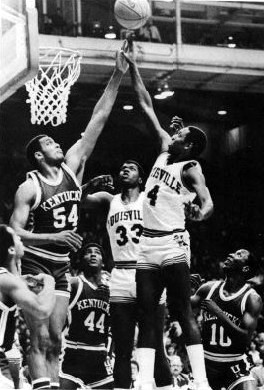 |
over UK's Melvin Turpin |
The Cardinals would extend the lead to five and looked to be in control of the game. But then it was UK's turn to make a comeback, and they tied the game at 60-all after Charles Hurt rebounded a missed free throw and scored on the follow-up. With 0:16 left in the game, UK's Dirk Minniefield, who played a terrific overall game, lost his man and drove to the hoop for a lay-up which would have given UK a two-point lead. Instead of dunking the ball, he tried to lay it in but the attempt was blocked by Louisville center Charles Jones and the ball ended up in Louisville's hands, and was soon converted into a score on the other end of the floor by Lancaster Gordon.
Kentucky had one chance to tie the game and they converted with 0:01 left when Jim Master got free and canned a 12-footer as time expired. Said U of L coach Denny Crum, "They put three guards in the game and we had two. I should have called time out. Master sneaked down the sideline. One of our forwards should have picked him up, but no one did." The Wildcats were jubilant with the last-second heroics to tie the score at 62-all, but as they ran off the court to prepare for overtime, the game would still need to be won.
As it turned out, the Wildcats never got a chance to catch their breath as the Cardinals came out of regulation and scored the first 14 points. The Wildcats were either turning the ball over (the Cardinals stole the ball on five of UK's first seven possessions) or missing shots while the Cardinals seemed to convert every time down the court. By the time Kentucky scored, the game was already over. The Cardinals had made 30 of their final 36 shots. Crum described the Cardinals performance as "I don't think we ever played any second half or overtime any better than today." He went on to marvel at how Kentucky could shoot 56% from the field during the game and still get beat. Said Louisville forward Rodney McCray, "Kentucky's everything I always thought it'd be. I'll cherish this victory, but you can't take anything away from UK. Uh-uh, you can't take a thing from those guys."
Louisville would go on to the Final Four that year, where they would run into their own buzz-saw as they were dismantled by the Houston Cougar's 'Phi Slamma Jamma' squad in one of the more memorable games of the 1980's. The Kentucky players were heartbroken. Over a decade later, UK point guard Dirk Minniefield still couldn't bear to watch a replay of what was the final game of his career. After finally being talked into it, Minniefield remarked, "I played pretty well. Everybody on our team did. We played as hard as we could. Louisville just played better. I can give them credit." And then a pause. "But I still should have dunked that ball."
[Boxscore] - 1982-83
The game between the two programs ignited the imaginations of both fans and led to even more intense pressure that the two should meet on a consistent basis. It got to a point that unless Kentucky got serious about scheduling U of L, that the state legislators might try their hand at forcing it to happen. Joe Hall continued to cling to the policy of not playing in-state schools, and petitioned the UK athletic board to uphold the tradition. But support was weakening in the face of increased public pressure. Athletic Director, Cliff Hagan, began to back away from the policy and to isolate Hall who was dutifully toeing the line. In an interview with Jerry Tipton of the Lexington Herald-Leader, Hagan said "If the coach wants to play, we'll play. It's always the coaches who decide whom they want to play, where they want to play and if they're going to play. He's [Hall] continuing a practice. If he wanted to change it, I'm sure we'd change it."
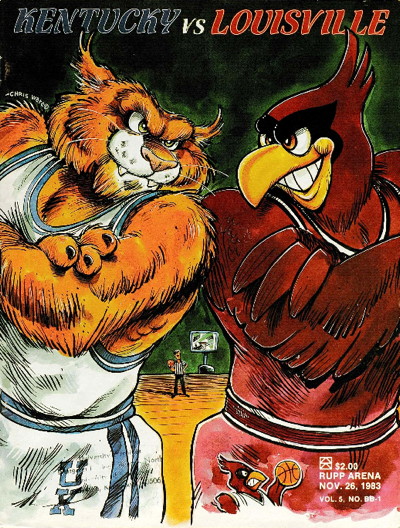 |
The first regular season match-up in over 60 years tipped off the 1983-84 season for each team and was shown nationally on cable. Billed as "The Battle of the Bluegrass" the game marked the return of UK All-American 7-footer Sam Bowie from leg injuries which had kept him out for two full seasons. The rest of the squad had all summer to think about their heart-breaking loss to the Cardinals. To say the Cats were ready to go and had something to prove was an understatement.
 |
The game was close during the opening minutes, however partway through the first half with Kentucky holding to a 13-12 lead, Louisville's Mark McSwain was whistled for a technical foul for wearing a jersey number which didn't match the official scorebook. After that, things began to unravel for the Cardinals as soon the Wildcats would go on a 11-0 run. Key in that sequence was two steals by UK freshman James Blackmon, who converted both into points within ten seconds of each other. "I don't know what happened," said Gordon. "I looked up at the scoreboard and we were way behind. They got a couple of steals that really hurt."
Bowie failed to score a field goal, but he seemed to do everything else, playing excellent defense, helping to break the dreaded Louisville press and recording 10 rebounds along with shooting 7 of 8 from the free throw line. In fact, the Cats outscored Louisville 27-2 from the free throw line and that proved to be the difference in the game.
Louisville could never get back into the game, thanks largely to Kentucky's pressure which kept the Cardinals off-balance all night. Jim Master led the Wildcats with 19 points while Turpin added 16 and Kenny Walker (who had been battling back spasms) added 13. Mark McSwain was the only Louisville player to record double figures with 10 points.
Despite the drubbing, the Cardinals were still confident after the game. Asked to assess the situation, U of L's Manuel Forrest said, "It's the same old thing. Kentucky usually starts strong and loses momentum at the end, while we usually start slow and gain momentum. I only hope it turns out that way again this year." This particular year, the prediction would be put to the test.
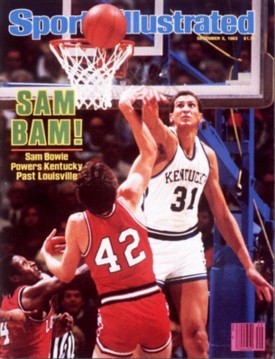
[Boxscore] - 1983-84
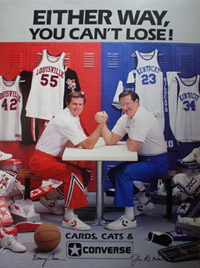 |
All of these teams spent most of the year in or around the top five in the country so when the NCAA pairings were released which had Kentucky and Louisville matched up yet again, the Wildcats weren't particularly concerned given the rout earlier in the season, and especially since the game would be held in UK's own Rupp Arena. (A practice by the NCAA which would later be outlawed because it was felt it could give an undue advantage to the home team.) Kentucky did easily dispatch Brigham Young in the second round (UK received a first-round bye) while #5-seeded Louisville beat Morehead and survived against #4-seed Tulsa to force the matchup.
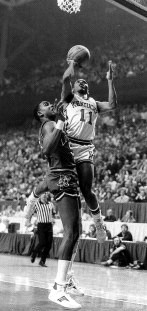 |
Beal was the difference in the game. After undergoing knee surgery and other assorted injuries, Beal was finally given a starting position late in the season. This gave Kentucky a point guard with speed who could distribute the ball and seemed to change UK's fortunes for the better. The first game of the season against Louisville, Beal played only four minutes and failed to score. In the rematch, Beal proved to be the difference in the game as he helped lead the Wildcats in scoring with 15 points, dished out nine assists and made six steals. With Sam Bowie and the rest of the Wildcats controlling the boards, Kentucky was able to come back in the second half and take what looked to be a commanding 57-49 lead with under six minutes remaining.
The Cardinals, again led by their guards Wagner and Lancaster, made a final bid to come back late in the game by going on a 10-4 run. This put the Cardinals within two points, however Kentucky soon extended it again by hitting four free throws. This was followed by a series of free throw attempts on each side. The game was sealed when UK freshman (and Louisville native) Winston Bennett rebounded a Jim Master free throw miss, converted the shot and was fouled.
Thanks to the under-appreciated Beal, Kentucky averted a potentially devastating blow from their in-state foe. The Wildcats went on to the Final Four that year. UK senior Jim Master underscored the importance of the victory. "We had to win this game because of the fans," he said. "If we would have lost we would have never been able to live it down. We would have never stopped hearing about it. Ever."
[Boxscore] - 1983-84
The series which was signed in 1983 and saw the Cardinals travel to Lexington for the initial game finally brought the Wildcats to Louisville the following year. Kentucky was no stranger to the city of Louisville or Freedom Hall, however this would be the first time since 1922 that they would be the visiting team.
 |
Similar to the game the previous spring, the underdog and visiting squad jumped out to a lead and controlled the game through the first half. The Wildcats attacked the Louisville defense by setting picks to open forward Kenny Walker for mid-range jump shots. The junior forward had the best game of his career to date with 32 points and 15 rebounds and Kentucky held a 30-28 lead at halftime.
But Louisville came back in the second half to take the lead and the victory, largely on the back of Cardinal forward Billy Thompson, who scored 17 points and grabbed 12 rebounds to pace U of L. Backing him up was Mark McSwain with 13, Manuel Forrest with 12, Barry Sumpter with 10 and Jeff Hall with 10 points. The game was not put out of reach until UK sophomore Winston Bennett fouled out with less than two minutes remaining. Bennett, who was returning to his hometown (where he starred at Male High School), scored 14 points in a gutty performance to back up Walker.
There was a tense moment late in the game when Manuel Forrest, who had been ailing with a Achilles' tendon inflammation, found himself wide open on a fast break after Billy Thompson had blocked a shot. Forrest went in for the dunk but then dropped to the ground on the weak foot. He eventually walked off, but not before scaring the Freedom Hall crowd who were faced with the prospect of yet another Cardinal going down to injury. When asked about why he dunked the ball rather than taking a more gingerly route by laying it in, Manuel said, "It was Kentucky. I had to." He added, "If I had it to do over again I'd do it all the same way."
[Boxscore] - 1984-85
The 1985-86 season saw both Kentucky and Louisville return near the top to college basketball elite after each suffering down years in 1985. Kentucky was sporting a new coach in former Arkansas coach Eddie Sutton and the Wildcats were enjoying a 7-1 start, with their only loss to Kansas on the road. Leading the charge for the Wildcats was senior All-American Kenny Walker along with senior point guard Roger Harden.
The Cardinals were also enjoying a renaissance of sorts, with their star guard Milt Wagner returning to complete his senior season on the hardwood after missing the previous season with a broken foot. Joining him were seniors Jeff Hall and Billy Thompson, along with a group of outstanding freshmen which included Tony Kimbro, Kenny Payne and a unheralded center from Savannah Georgia in Pervis Ellison. Louisville was 6-2 by the time they met the Wildcats on December 28th, with their two losses coming to Kansas and St. Johns.
 |
Kentucky won through their aggressiveness, beating the Cardinals to the boards for a 36-24 advantage, and more importantly, a 20-5 offensive rebound edge thanks to Bennett and Walker, who also grabbed seven on the offensive end. Said U of L guard Jeff Hall, "They killed us on the boards." The Wildcats also found their way to the free-throw line, where they converted 19 of 25 tries, as opposed to six of seven for Louisville. Joked Cardinal Coach Crum about the free throw discrepancy, "That's a lot better than the last time we were up here. . . It was 34 to 5 then, so we're gaining on them. I didn't have a whistle. I wish I had, because there were a lot of them I would have called differently. But I'm prejudiced."
The first half was tight, with neither team gaining the upper hand, although the Wildcats twice built a seven-point lead before settling on a 33-30 halftime score. In the second half, the Wildcats broke open a 50-50 tie with a 9-2 run with under five minutes remaining. The Cardinals came back to close within three points, at 61-58 but that was as close as it got. Richard Madison was credited with a field goal on a Pervis Ellison goal-tending call and Roger Harden sealed the victory with two last-minute free throws.
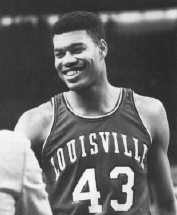 |
Despite the loss, Sutton was still impressed with the Cardinal team. "They have the type squad, if they continue to improve -- and I believe they will - that may very well be in Dallas." As it turned out, Louisville not only made it to Dallas to play in the NCAA Final Four, but they ended up winning it that year. One might think that a second NCAA title in a span of a handful of years by U of L would quiet the UK fans, but that didn't always prove to be the case. Soon after, T-shirts sprouted up around the Bluegrass proclaiming, "Louisville - #1 in the Nation, #2 in Kentucky" based on the early-season loss to the Cats.
As for Winston Bennett, he was happy that his coming out party came against his hometown school, a school which he very nearly attended and was still a fan of. Said Winston, "I'm looking forward to going back to Louisville and seeing all the people there and hearing what they have to say about losing."
[Boxscore] - 1985-86
The following year the game returned to Freedom Hall in what should have been a comfortable situation for the Cardinals. Coming off a national title, the Cardinals returned an athletic and experienced squad, led by sophomore big man Pervis Ellison, who played an integral role in the 1986 title run. However, despite this, the Cardinals had struggled early in the season losing all three games in the Great Alaska Shootout and entering the game with a 4-5 record. The prevailing thought was that the notoriously late-starting Cardinals would come around. The Wildcats entered the game with a better record, 5-1, but the general consensus was that they were vulnerable. They had lost their All-American forward Kenny Walker to graduation and their other forward, Winston Bennett was out with knee surgery and would miss the season. As if things couldn't get worse for the undersized Wildcats, 6-11 forward Cedric Jenkins was sitting out the game with a sore foot.
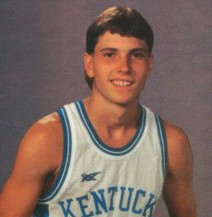 |
Although the two teams were now playing each other regularly, and that seemed to tone down the rhetoric, the tension between the two schools continued unabated, as the two programs vied for bragging rights on and off the court. Kentucky Coach Eddie Sutton set off a firestorm when he referred to the defending National Champion Cardinals as "Little Brother." "Louisville's got a great program, but Kentucky's got the best," said Sutton. The charge was especially stinging to the Louisville faithful, who seemed to be eternally under the Big Blue's shadow, even when it was the Cardinals who were tops in the nation. Despite the denials, the characterization stuck, and may prove to be the most lasting legacy Sutton ever left to the University of Kentucky.
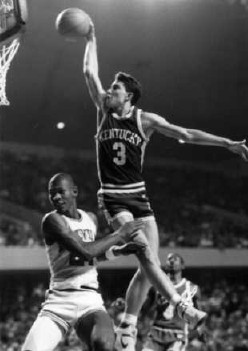 |
The contest was tight early on, but midway through the first half the Wildcats spurted out to a 29-18 lead, in large part based on stellar shooting from behind the arc. The Cardinals clawed back to get within eight at halftime, 36-28. However coming out for the second half, the Wildcats went on a 10-0 run which effectively put the game away. Even with the big lead, the 'Cats weren't done. Kentucky continued to slash and shoot three-pointers. Chapman hit five of eight threes while Ed Davender, James Blackmon and Derrick Miller combined to contribute a stellar six of nine from behind the arc. In comparison, Louisville shot an anemic one of eight three point shots for the game. Said the freshman sharpshooter Miller, "When we saw Louisville go to that zone defense, we started looking at each other and smiling. that was just what we wanted to see."
The margin continued to balloon through the second half, to such an extent that it became embarrassing for the Cardinals, as the capacity crowd in Freedom Hall sat in stunned silence. Chapman, dubbed "King" Rex, at one point drove to to the goal and had the audacity to attempt a dunk right over U of L's towering Pervis Ellison. He was blocked but just the attempt sent a message. "I don't know what I was thinking about, trying to dunk on Pervis, and I got it knocked down my throat. Then I got one on Kenny [Payne]. That's the way it is," said Chapman. Near the end of the game, UK's lumbering center Rob Lock found himself with a wide-open alley to the goal, to which he drove and flushed the ball. "The whole side of the court was open. . . I took a dribble, then stopped, looked and nobody moved because I never do something like that... so I went on," chuckled Lock.
The final margin was 34-points, the worst loss of Crum's career. Commented Sutton about the shocking outcome, "We're not 34 points better than Louisville. I think everybody knows that." Injured UK forward Winston Bennett sat in the stands, one of the few in attendance who enjoyed the show. "A perfect game ?" opined Bennett. "I don't know about that . . . but it was close enough, wasn't it ?"
[Boxscore] - 1986-87
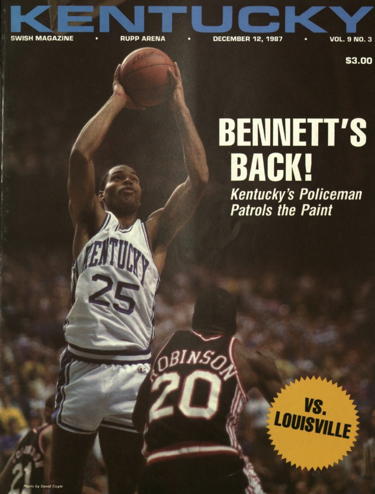 |
The Cardinals were unranked and had just been swamped by 15 points to Notre Dame the week prior in the Big Four Classic in Indianapolis. Not many expected Louisville to make a game of it, except the ones who mattered the most, Denny Crum and the Cardinal players themselves.
Kentucky sprinted ahead in the first half, leading at one point by 16 points. UK held a commanding 45-32 lead at intermission. But the Cardinals roared back in the second half, largely based on a withering press and clutch shooting from junior Pervis Ellison and sophomore forward Kenny Payne. The Cardinals shot 64 percent in the second half and pulled close to the Wildcats late in the game. With just over three minutes left in the game, Kentucky turned the ball over three straight times, and the Cardinals converted each time to take the lead 72-70, stunning the Rupp Arena crowd. Later Rex Chapman converted off a Rob Lock free throw miss to put Kentucky back in the lead, only to see Ellison hit a jumper with less than a minute remaining to give the Cardinals a 75-74 edge.
 |
Crook, Lock and Jenkins all batted the ball unsuccessfully. But it was Jenkins who was in position to make a second attempt. He reached with his long arms and gently guided the ball into the hoop as time expired. The two points were the only two scored by Jenkins in the entire game, and likely the most important basket of his career at UK. Said a dejected Herbert Crook, "They got lucky at the end. We should have won."
The game was a good barometer for the season, as Kentucky was not as good as their lofty ranking and Louisville was not as bad as some assumed. "I couldn't be prouder of a team," said Crum. "I'm tickled to death. We couldn't play any better." Coach Sutton, who before the game stated he would be happy with a one-point win, was true to his word.
[Boxscore] - 1987-88
Amazing as it may sound, but Pervis Ellison entered his senior season with a national title under his belt but without a win over the Big Blue of Kentucky. Said U of L freshman Everick Sullivan, "All week the seniors had been talking about how much they wanted to beat Kentucky . . . They said they had never beaten them and they were tired of losing. They wanted to win. They wanted to win big." The 1988-89 season looked to be the year to break the streak and potentially do it with big numbers. Louisville had lost their first two games of the year by close scores in the Big Apple NIT, but bounced back to blow away Indiana in the Big Four Classic en route to a six-game winning streak entering the game against Kentucky on December 31st in Freedom Hall.
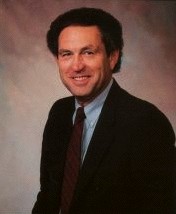 |
Kentucky jumped out to a 10-3 lead in the first three minutes of the game over the Cardinals who had been coming off a 10-day stretch without playing a game. But if UK fans were looking for a miracle, it wasn't going to happen that day. The Cardinals roared back (with five of their first six baskets on three-point shots) to tie the score at 19-all and then spurted a few times to push the lead to 15 points, 50-35, by halftime.
After a shaky second half which saw the Wildcats whittle the lead down to eleven points a couple of times, the Cardinals pushed the lead back out each time. Near the end, the Cardinals shook loose for a number of slam dunks which invigorated the crowd and closed out the game in style. The final score was 97-75, a 22-point margin which left the U of L coaches and most of the players happy, but some in the crowd a bit disappointed that the Cardinals didn't eclipse the 34-point humiliation they witnessed two years prior in the Hall. "People wanted us to beat them 30," said U of L center Felton Spencer. "Some people wanted 40. They just wanted us to beat them bad."
The Wildcats didn't play badly, they were simply outclassed by a far superior team. Junior guard Derrick Miller fired in 34 points to lead the Wildcats but he didn't receive enough support from his teammates. Center LeRon Ellis was bottled up by the senior Ellison and only scored seven points. Freshman Chris Mills contributed 13 points and 10 rebounds and Reggie Hanson added 11, however Kentucky's bench was outscored by Louisville's bench 31-3.
The Cardinals were paced by Pervis Ellison with 20 points and seven rebounds. He received great support from the rest of the squad as Kenny Payne added 16 points and LaBradford Smith and Everick Sullivan chipped in 15 apiece. In all five Cardinal players scored in double figures. And for the first time in the series, the Cardinals outshot UK from the three-point line, hitting 7 of 20 treys. Said UK Coach Sutton, "Louisville is the best team we've played in the four years I've been at Kentucky. And the reason is they're a lot deeper and they can hit the three-point shot."
[Boxscore] - 1988-89
The Wildcats would end up the season with a losing record, 13-19, and soon after Eddie Sutton would be gone, leaving a program in disarray and soon to be hit hard with NCAA sanctions. Dark clouds loomed over the program. The Cardinals were in considerably much better shape. The team finished the season 24-9 after being beat by Illinois' 'Flyin' Illini' in the NCAA Sweet Sixteen. Closing out a decade which saw the Cardinals put two NCAA championships under their belt to none by UK, and with the program in Lexington in shambles, it appeared Louisville was well on its way to gaining an equal stature in the state of Kentucky. It was a good time to be a Cardinal fan.
Coming Soon - The Rick Pitino Years
![]()
Please note that the following reference materials were consulted for the above. 1.) Lexington Herald 2.) Lexington Leader 3.) Louisville Courier Journal 4.) New York Times 5.) Big Blue Machine by Russell Rice 6.) The Winning Tradition by Bert Nelli 7.) Above the Rim: The History of Basketball at the University of Louisville by Gary Tuell 8.) Basketball: The Dream Game in Kentucky by Dave Kindred 9.) University of Louisville media guide 10.) University of Louisville website among others.
Return to Kentucky Rivalries, Louisville Series Results, statistics, teams, opponents, players, coaches, opposing coaches, games or search this site.
Page written by Jon Scott. Please with any corrections or additional information.
Last Updated August 16, 2003